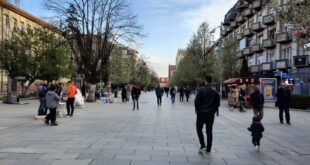 Bulgaria said on Wednesday (July 18th) it is sending an official request to Tripoli for the transfer of five Bulgarian nurses and a Palestinian doctor convicted of deliberately infecting more than 400 Libyan children with HIV.
Bulgaria said on Wednesday (July 18th) it is sending an official request to Tripoli for the transfer of five Bulgarian nurses and a Palestinian doctor convicted of deliberately infecting more than 400 Libyan children with HIV.
“It is possible that Libya will deny a transfer, but our agreement allows us to make a second such request,” Bulgarian Prosecutor General Boris Velchev said, referring to an agreement on legal assistance his country signed with Libya in 1984.
He added that while the formal request for the medics’ transfer would be sent Wednesday, it is unclear how long it would be before the nurses and the doctor, who was granted Bulgarian citizenship recently, are brought home.
The move became possible after Libya’s top legal body decided late Tuesday to commute the medics’ death sentences to life imprisonment. The High Judicial Council issued its ruling after a deal with the families of the 438 infected children, under which each received $1m in compensation.
In return, they dropped their demands for the execution of the six, who have been held in a Tripoli prison since 1999.
Bulgarian nurses Kristiana Vulcheva, Nasya Nenova, Valentina Siropulo, Valya Chervenyashka and Snezhana Dimitrova, and the Palestinian doctor, Ashraf Juma Hajuj, were convicted of intentionally infecting the children with HIV and sentenced to death in May 2004.
Following international pressure, a retrial was ordered. It ended in December 2006 with the six again being condemned to death. Despite evidence showing that the outbreak of HIV at a Benghazi children’s hospital predated the medics’ arrival by at least a year, Libya’s Supreme Court upheld the death sentences earlier this month.
Maintaining their innocence, the medics have testified that the confessions some of them made were extracted under torture.
The EU and the United States, which have been supporting Bulgaria’s repeated calls for the health workers’ release, welcomed Tuesday’s decision, but urged Tripoli to take steps towards the quick resolution of the case.
“The fact that the High Judicial Council did not uphold the death sentence is a first relief,” European Commission President Jose Barroso said. “However, our objective is a solution which allows for the departure of the Bulgarian and Palestinian medical personnel from Libya and their transfer to the EU as soon as possible.”
While welcoming Tuesday’s ruling as “a positive step forward”, a senior US official noted this did not end the medics’ ordeal.
“We are encouraged at the commutation of the death sentences and we hope they will result in a way to let the medics return home,” Assistant Secretary of State David Welch said.
At a late-night news conference in Sofia, Bulgarian Foreign Minister Ivaylo Kalfin described the decision of the Libyan High Judicial Council as “a huge step in the right direction”. He also assured reporters that Sofia will use every possible avenue to ensure that the medics are transferred to Bulgaria.
Libyan Foreign Minister Abdel-Rahman Shalqam gave assurances Tuesday that Tripoli does not “mind that the Bulgarian nurses and the Palestinian doctor benefit” from the 1984 agreement between the two countries. Officials in Sofia have indicated that once the health workers return to Bulgaria they will likely be pardoned by President Georgi Parvanov.
However, some impediments must be overcome before a transfer is possible. Pending cases and fines against the five nurses and the doctor could potentially delay their extradition.
“I feel some relief as the death penalty no longer hangs over their heads,” said Dr. Zdravko Georgiev, husband of one of the nurses, Valcheva. “But at the same time this decision prolongs the agony … I have no idea when we will be able to come back to Bulgaria.”
Georgiev was acquitted at the same 2004 HIV infection trial that ended in his wife’s conviction, but he has not been allowed to return home.
 Eurasia Press & News
Eurasia Press & News



